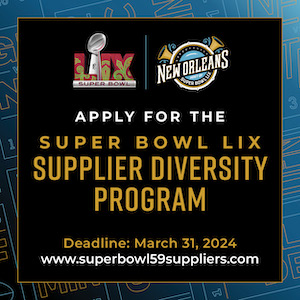Liberty among banks receiving a capital investment from Wells Fargo
3rd May 2021 · 0 Comments
By Ryan Whirty
Contributing Writer
Liberty Bank of New Orleans is one of five African-American financial institutions that will receive capital investment from Wells Fargo as part of a corporate effort to assist minority deposit institutions (MDIs) serve customers in underserved or vulnerable populations.
After launching its MDI program last year with initial investments in six minority-operated banking firms from across the country, Wells Fargo added five more institutions to its list of beneficiaries, last week. Liberty Bank was founded by CEO Alden McDonald in 1972 and has since become one of the country’s most respected, successful financial institutions, especially in terms of providing funding and support of Black customers, entrepreneurs and communities.
Gigi Dixon, head of external engagement for diverse segments representation and inclusion at Wells Fargo, said last week that the banking giant’s MDI equity investment program is designed to support institutions like Liberty that have established a tradition of Black empowerment and growth over the last century as a means for community uplift.
“Liberty Bank is one of these Black-owned, Black-led financial institutions that has an established legacy of investment-based services that provide stability to the communities they serve,” Dixon told The Louisiana Weekly.
Todd McDonald, vice president of strategy for Liberty Bank, said Liberty welcomes the infusion of investment capital. He said Liberty will use the $6 million in funding from Wells Fargo to shore up its Tier 1 capital, which is the share of an institution that is kept as core capital that isn’t touched but rather used to anchor the bank’s finances to allow it to conduct the business of lending, trading, investing and other financial ventures. Tier 1 capital often includes equity capital and disclosed reserves.
McDonald said by keeping the Wells Fargo infusion of capital in Tier 1, Liberty will be freer to invest in the community as the pandemic continues. He said such roles are vital for MDI’s and the people they serve.
“The recent transactions collectively allow us to grow moving forward, when we make our loans and investments,” McDonald said. “That should give us the fuel to add more impact in the community.”
He added that Liberty will keep the lines of communication with Wells Fargo open to hopefully facilitate more investment opportunities. “We look forward to Liberty and Wells Fargo having a strong relationship going forward,” he said.
Wells Fargo’s MDI program will provide up to $50 million to Black-owned banks, a list of beneficiaries that now includes Liberty, as well as four others just announced last week – Carver State Bank in Savannah, Ga.; Citizens Trust Bank in Atlanta, Ga.; First Independence Bank in Detroit, Mich.; and Unity National Bank in Houston, Texas.
Dixon said that as part of its MDI effort, each beneficiary institution will be able to meet with relationship management teams made up of experienced, seasoned Wells Fargo bankers who can discuss the MDI’s assets, capital, resources, portfolios, missions and existing financial lending operations to come up with a long-term strategy that is tailor-made for the individual MDI and is targeted at and designed to address the specific needs for the communities in which the banks operate.
“[The relationship teams] will be sitting down and talking with each MDI to see what things they need to help shore up their bottom line and help them grow in the communities they serve,” Dixon said.
Dixon said Wells Fargo first began planning out ways it could provide additional support to banks that operate in and serve Black and Brown communities and other underserved populations before the start of the COVID-19 pandemic last year that has crippled the national economy, particularly among African Americans and other people of color.
The Wells Fargo’s planning for its MDI program also began before the spate of deaths of unarmed Black civilians at the hands of police officers – including George Floyd, Breonna Taylor and, most recently, Daunte Wright and Adam Toledo – that fueled the surging Black Lives Matter effort and other nationwide movements for racial and social justice.
However, although the MDI program had its genesis before the health, economic and justice crises of 2020, Dixon said those society-wide developments only heighten the need for Black-operated financial institutions to help provide the type of financial support, investment and growth communities of color desperately need to uplift such populations in their effort to combat and overcome such societal injustices.
“We decided to invest in MDIs that are able to reach local communities where they operate and give them the excellent opportunities they need to provide services to the lower- and middle-income communities they serve,” Dixon said.
She said that beyond its MDI program, Wells Fargo will strive to continue to create ways to support Black communities in ways that extend past the pandemic and as the country continues to grapple with issues like social justice. She said MDIs need assistance in making people aware that they exist and let people know that they can provide services like resources and capital investments, business and personal loans, home loans and funding for college.
“We’re in it for the long haul,” she said.
This article originally published in the May 3, 2021 print edition of The Louisiana Weekly newspaper.



